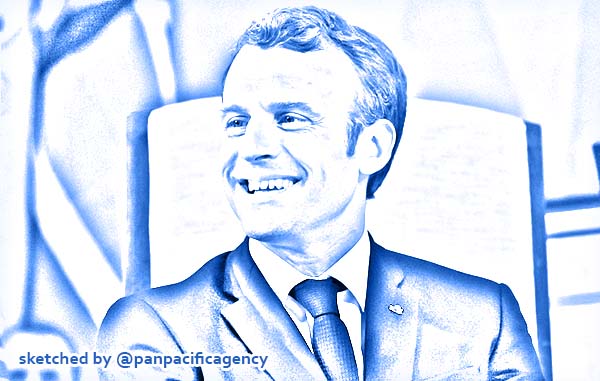[Analytics] Have Macron’s comments caused trouble for Southeast Asia’s Muslim govts?

French President Emmanuel Macron © EPA-EFE/SALVATORE DI NOLFI. Sketched by the Pan Pacific Agency.
Malaysia and Indonesia’s governments have been pressured by their citizens to take a strict line against the French president’s controversial remarks. However, some politicians are seemingly using the opportunity to make political gains. Umair Jamal specially for the ASEAN Today.
In early October, French President Emanuel Macron enraged Muslims around the globe by referring to Islam as a “religion in crisis all over the world” as he defended the use of images of the Prophet Muhammad, which some have condemned as blasphemous or incendiary, as free speech.
The French president’s statement that he will not stop the publishing of the profane cartoons depicting the Prophet Muhammad have sparked outrage across the Muslim world.
Many Muslims have accused Macron of trying to legitimize Islamophobia and several Muslim-majority countries, including Indonesia and Malaysia, have condemned Macron’s attitude toward Muslims and Islam.
With his controversial remarks, Macron has not only put Indonesia and Malaysia’s right-wing Islamist groups in the driver’s seat but also forced their governments to offer legitimacy to such groups. The situation may also provide an opportunity for many prominent politicians in the region whose political fortunes have been dwindling.
Macron’s comments have driven thousands of Indonesian protesters to the streets.
Last week, Indonesian Muslims marched to the heavily-guarded French Embassy in the capital, Jakarta, chanting slogans including “God is Great” and “Boycott French products.”
Indonesian President Joko Widodo condemned Macron’s comments in a statement, calling it offensive toward Islam and Muslims. “Linking religion with terrorist acts is a big mistake,” Widodo said. “Terrorism is terrorism, terrorists are terrorists, terrorism has nothing to do with any religion.”
The Indonesian Ulema Council (MUI) condemned President Macron by saying that “Macron indirectly backs Islamophobia movements” and has called for protests and boycotts against France.
The Malaysian government has also condemned Macron’s statement by saying that associating “Islam with terrorism [is] certainly beyond the scope of such [freedom of speech] rights.”
“We strongly condemn any inflammatory rhetoric and provocative acts that seek to defame the religion of Islam as the world has recently witnessed in the form of populist speeches and publication of blasphemous caricatures depicting the Holy Prophet Muhammad,” said Malaysia’s Foreign Minister Hishammuddin Hussein in a statement.
Meanwhile, the Malaysian Consultative Council for Islamic Organization has asked the government to boycott French products. “We call on all right-minded people of the world to boycott France in every possible way,” said Azmi Abdul Hamid, the group’s chairman.
Does the situation offer political leaders a narrative to push anti political agendas at home?
Amid the public outcry, politicians with fading fortunes may also be taking advantage of such ideological pressures to capitalize on popular sentiment. Mahathir Mohamad, Malaysia’s former prime minister, is known for legitimizing and prompting right-wing Islamist agendas in the country for political gains.
After President Macron’s controversial comments, Mahathir criticized the French government for blaming all Muslims for the actions of one person. In a Twitter post, he justified attacks against French people by saying that Muslims have the right “to be angry and to kill millions of French people for the massacres of the past.”
Referring to President Macron’s statement, Mahathir further noted that “Since you have blamed all Muslims and the Muslims’ religion for what was done by one angry person, the Muslims have a right to punish the French.”
While Twitter has removed the post, the impact of Mahathir’s remarks was felt globally. In Pakistan, several Friday sermons mentioned Mahathir’s vengeful remarks and used them in the context of prompting Jihad against people accused of blasphemy.
Mahathir’s post may have been meant to rally crowds of support as his political support base has lost steam. Since his removal from the government earlier this year, Mahathir has been making attempts to dislodge the current government. His latest attempt in this regard was to push for a no-confidence vote in the parliament against his successor and current Prime Minister Muhyiddin Yassin. It is unclear if the motion will be debated when the parliament convenes later this month.
Fierce rhetoric like that employed by Mahathir doesn’t make sense unless it is used to put pressure on and undermine a government. Such rhetoric also feeds into Islamist agendas and creates a charged public sentiment that doesn’t leave much space for a government to adopt independent policy. This doesn’t bode well for Muslim nations facing serious challenges of growing militancy and extremism. Such rhetoric only undermines policies that are meant to contain the role and growth of right-wing Islamists who fuel extremism domestically.